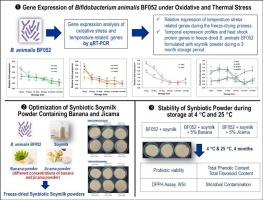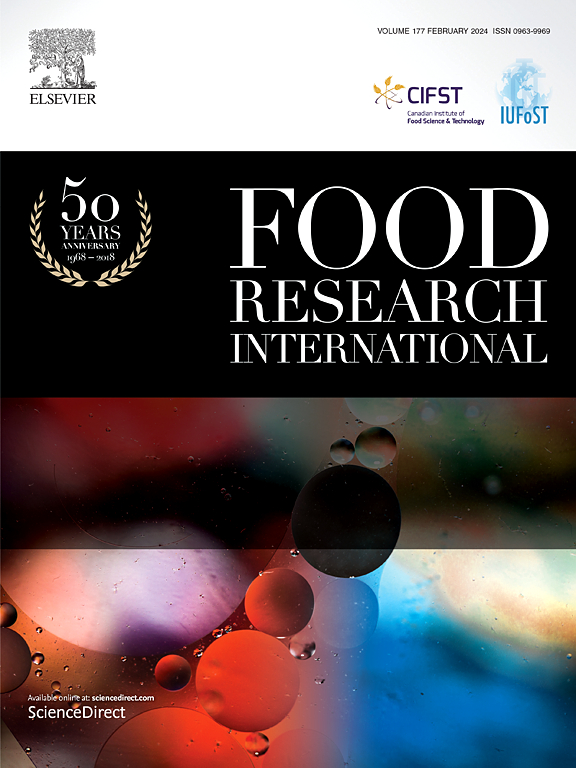Transcriptional analysis of oxidative-tolerant and temperature-sensitive genes of Bifidobacterium animalis BF052 during freeze-drying process and development of its soymilk-synbiotic product containing banana and jicama powders
IF 8
1区 农林科学
Q1 FOOD SCIENCE & TECHNOLOGY
引用次数: 0
Abstract
This study investigated the transcriptional stress responses, physicochemical stability, and functionality attributes of Bifidobacterium animalis subsp. lactis BF052 in freeze-dried synbiotic powder formulations containing soymilk with banana or jicama powder. Gene expression profile revealed that oxidative stress-related genes (mutT and rnr) and temperature stress-related genes (groES2, clp1, csp1 and csp2) were significantly upregulated during freeze-drying and early storage (p < 0.05), indicating their pivotal roles in cellular defense, DNA repair, and protein homeostasis. Physicochemical analysis of the synbiotic powders demonstrated that formulations containing soymilk with banana or jicama powder exhibited improved water solubility index up to 65.4 %, reduced particle size, and favorable moisture and water activity levels. Probiotic viability remained above 90 % following the freeze-drying process, with viable cell counts exceeding 108 CFU/g. No statistically significant differences were observed between the banana- and jicama-based formulations (p > 0.05), indicating maintained functional stability. Antioxidant activity, as measured by 2,2-diphenyl-1-picrylhydrazyl (DPPH), total phenolics, and flavonoids, was highest in formulations combining soymilk and 5 % (w/v) banana or jicama powder (p < 0.05), suggesting an additive effect. Storage at 25 °C enhanced flavonoid stability without compromising microbial integrity. These findings demonstrate that synbiotic powders formulated with B. animalis BF052, soymilk, and low concentrations of banana or jicama powder exhibit excellent functional and physicochemical properties, offering strong potential for commercial development as shelf-stable nutraceutical products.

动物双歧杆菌BF052在冻干过程中耐氧化和温度敏感基因的转录分析及其含香蕉和豆薯粉的豆浆合成产品的研制
本研究研究了动物双歧杆菌亚种的转录胁迫反应、理化稳定性和功能特性。乳酸菌BF052在冻干合成粉配方中含有豆浆和香蕉或豆薯粉。基因表达谱显示,氧化应激相关基因(mutT和rnr)和温度应激相关基因(groES2、clp1、csp1和csp2)在冻干和早期贮藏过程中显著上调(p < 0.05),表明它们在细胞防御、DNA修复和蛋白质稳态中起着关键作用。对合成粉的理化分析表明,含有香蕉或豆薯粉的豆浆配方的水溶性指数提高到65.4%,颗粒尺寸减小,水分和水活性水平良好。冻干后益生菌活力保持在90%以上,活菌数超过108 CFU/g。以香蕉和豆薯为基础的配方之间没有统计学上的显著差异(p > 0.05),表明保持了功能稳定性。以2,2-二苯基-1-苦味酰肼(DPPH)、总酚类物质和类黄酮含量测定,豆浆与5% (w/v)香蕉粉或豆薯粉组合的抗氧化活性最高(p < 0.05),表明两者存在加性效应。在25°C下储存增强了黄酮类化合物的稳定性,而不影响微生物的完整性。这些研究结果表明,由动物双歧杆菌BF052、豆浆和低浓度的香蕉或豆薯粉配制的合成粉末具有良好的功能和物理化学特性,作为货架稳定的营养保健品具有很强的商业开发潜力。
本文章由计算机程序翻译,如有差异,请以英文原文为准。
求助全文
约1分钟内获得全文
求助全文
来源期刊

Food Research International
工程技术-食品科技
CiteScore
12.50
自引率
7.40%
发文量
1183
审稿时长
79 days
期刊介绍:
Food Research International serves as a rapid dissemination platform for significant and impactful research in food science, technology, engineering, and nutrition. The journal focuses on publishing novel, high-quality, and high-impact review papers, original research papers, and letters to the editors across various disciplines in the science and technology of food. Additionally, it follows a policy of publishing special issues on topical and emergent subjects in food research or related areas. Selected, peer-reviewed papers from scientific meetings, workshops, and conferences on the science, technology, and engineering of foods are also featured in special issues.
 求助内容:
求助内容: 应助结果提醒方式:
应助结果提醒方式:


